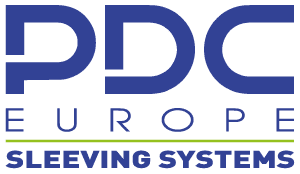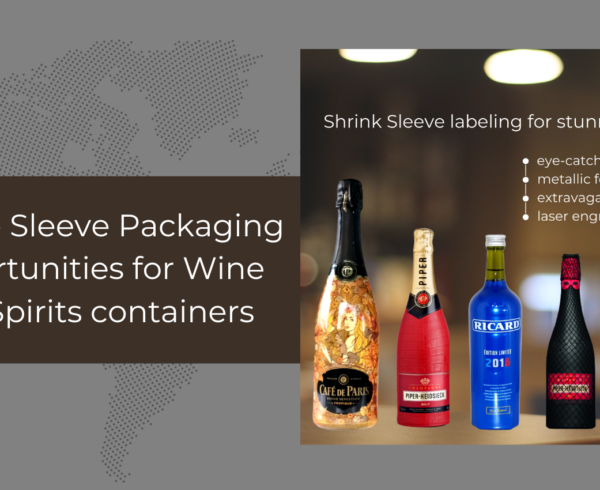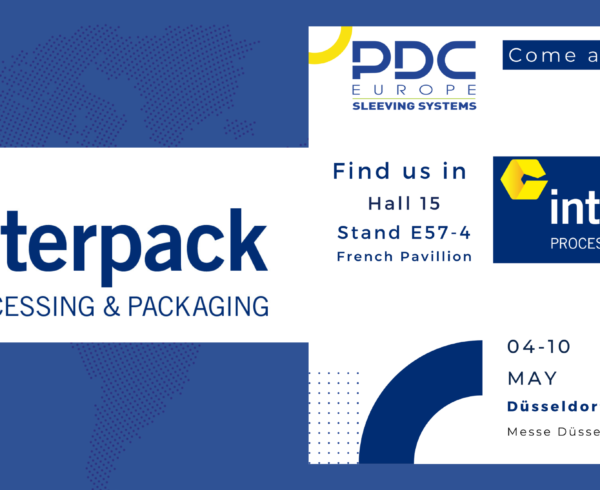PDC Europe is releasing a new generation of shrink tunnels – hot air and steam! It’s time for you to choose your shrink tunnel
It is time to give you some information regarding the different technologies available and how you can choose your shrink tunnel depending on your application.
Shrink tunnels play a critical role in a successful shrink sleeve labeling application. They use calories to shrink the film/sleeve around a container or product. There are many variables to consider when it comes to selecting the right shrink tunnel for your product: the type of film, conveyor speed, shape of the product, whether the container is full or empty, fill temperature of the product, and even the temperature of the plant, are all relevant factors. To get the most advantage of shrink labeling and have a stunning final package appearance, understanding and selecting the optimal shrink tunnel is paramount.
Tunnel Selection for Maximum Flexibility
Shrinking sleeves is a function of time and temperature, so there is a correlation of tunnel length to conveyor speed, based on product size, parts per minute, and required dwell time in the tunnel. Because of these, shrink tunnels vary by:
- Opening (which determines the size range of the products that are able to be run)
- Overall tunnel length (which will give you the time the container will spend in the tunnel)
- Number of heating zones (how different the settings can be during the shrinkage process)
- Wattage per zone (or number of calories transferred to the container)
Multiple Heating Zone Shrink Tunnels and Their Advantage
To achieve the optimal shrinking process for producing a great looking product, it is common with shrink label applications to use either a dual-zone tunnel, multiple tunnels or, in the case of high line speeds, multiple dual-zone tunnels.
Dual zone tunnels have two heating chambers and two thermostatically controlled zones all housed in one shell. The two zones enable greater control over the shrink process. This allows the operator to set dissimilar temperatures in the different zones, applying heat as needed in the optimal shrink sequence. Oftentimes, the label at the base of the container is shrunk first, then the body, and finishing at the shoulder and neck areas.
Different Tunnel Types
Generally, there are three ways to deliver heat in a shrink tunnel: Steam, Hot Air, and Radiant Infrared. Each is suited to a specific need and employs control systems to precisely maintain the temperature.
Steam Shrink Tunnels
Steam Shrink Tunnels have manifolds with valves that control steam flow in individual steam pipes that can also be adjusted to direct the steam as needed. Steam Shrink Tunnels are highly versatile in what they can shrink. They are ideal for product lines where high quality and distortion-free graphics are most important. For example, they are great for full sleeve label applications on contoured containers. Steam Tunnels are also used on empty bottles to avoid deformation as they operate at lower temperatures (80-85°C) than dry heat shrink tunnels (180-200°C). They are also used with containers under pressure, or when low flash point or flammability is a factor, again due to lower operational temperatures.
Hot Air Shrink Tunnels – Dry Heat
In Hot Air and Radiant Tunnels internal baffles channel airflow over heating elements and through chamber baffles, the design of which is varied to best suit your packages. Tunnels are designed to pull up to existing conveyors and are suspended from above by a variety of tunnel stands. Conveyors, conveyor belts, and wear strips must be made of materials appropriate for the temperatures generated, which can range from 100°C in the tunnel to 315°C at the elements.
In Convection Hot Air Tunnels fin-strip electric elements heat the air that is then blown on the sleeve and product resulting in the effective distribution of hotter or cooler air.
Radiant Infrared Tunnels
Infrared Radiant Tunnels emit infrared radiation that is absorbed by the sleeves. They are great for warming up containers and for simple shrink applications. However, radiant heat tunnels are not that effective when used alone so are mainly used in tandem with convection hot air shrink tunnels.
Gaining an understanding of different types of shrink tunnels and how they work can have a large impact on the success of your shrink sleeving project. The best ways to determine the ideal tunnel for your application, and prove it can be replicated in a production environment, is to prototype and test the actual container. PDC has a shrink lab that can conduct a free shrink sleeve test on your products and labels, and send you a video of your product running through our tunnels. If you’re considering shrink sleeve labeling and unsure of which kind of shrink tunnel would work best for your product, let us help you get the end product you envisioned, and ensure it can be produced effectively. We have over 36 years of packaging experience providing high-quality machinery and shrink tunnels for even the most challenging sleeving projects. If you want us to help you choose your shrink tunnel, contact us today at +33(0) 322 78 93 15 or sales@pdceurope.com.
For the US please contact PDC International









